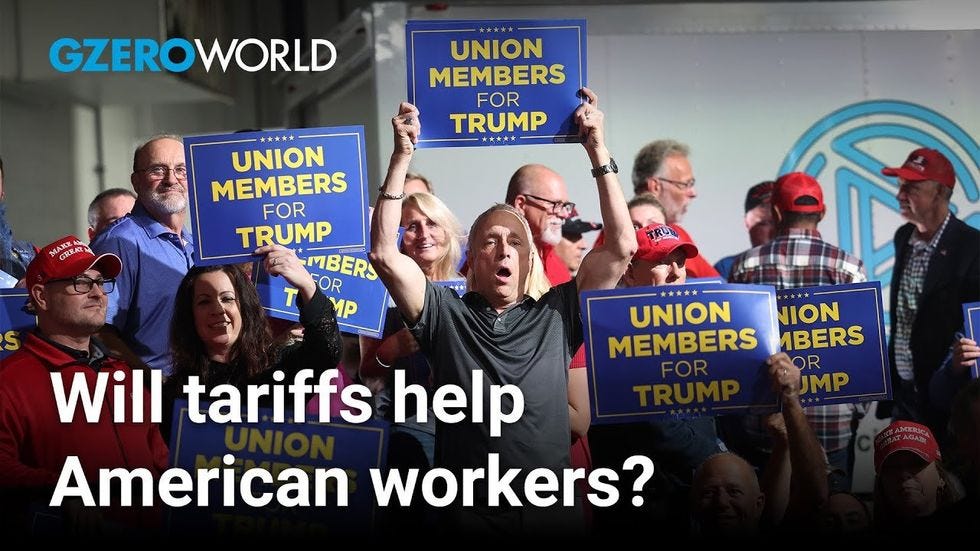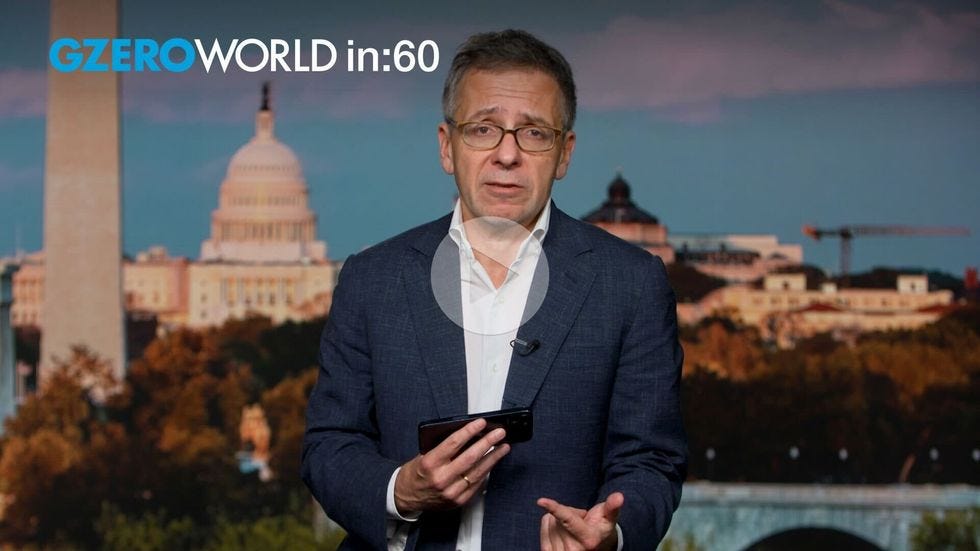Dear Reader,
This week, I answer your mailbag questions on the fall of Syrian dictator Bashar Assad, Romania’s annulled election, and whether I like pineapple on my pizza. Plus, I sit down with Oren Cass to discuss Donald Trump's tariff plan. And of course, your weekly rec from my dog Moose.
Let’s get to it.
- Ian
Assad’s fall, Romania’s canceled election, Trump’s Taiwan approach, and more: Your questions, answered
How did Bashar Assad get driven out of Syria after more than 20 years in power? What are your thoughts on his replacements?
I was surprised that Assad fell. He’s been such an important client for both Iran and Russia for decades and received their immediate support when the rebels began their offensive. But this was a particularly opportune time for the rebels to strike. Assad’s powerful friends were both distracted in other arenas: Iran with Israel (in both Gaza and, more importantly for Iran, Lebanon) and Russia with Ukraine. Interestingly, there is one key throughline connecting the fall of Mosul (Iraq), Kabul (Afghanistan), and Damascus (Syria) — all three were held by conscript armies that were fed, equipped, and trained by corrupt regimes … and when attacked by fierce radical groups fled as quickly as they could.
On its face, the fall of one of the world’s most oppressive dictators should be good news. Assad’s war against his own people led to the deaths of over 500,000 Syrians and millions of refugees fleeing into Turkey and from there to Europe. But I’m not yet confident that what’s replacing his regime will be much better. The Turkish-backed militants in charge are Hayat Tahrir al-Sham, or HTS, a former al-Qaida affiliate in Syria that formally cut ties with the terrorists but is still (as of now) labeled a terrorist organization by the United States and NATO. Turkey wasn’t all in on removing Assad (at first). If the regime change goes well (a big if), the real winner here will be Turkey, with Recep Tayyip Erdoğan sending millions of Syrian refugees back home, becoming the main influence on strategically important Syria, and leading the fight against the Islamic State. This would land Erdoğan in Donald Trump’s good graces if it leads to a withdrawal of American troops.
HTS is clearly serious about establishing itself as the new, legitimate government — and a policy (for now) of relative moderation and tolerance toward other groups in the country is making that easier. But there are still so many unknowns and reasons that this can go terribly wrong.
🔔 Subscribe to GZERO Media for free to get timely global analysis and news. For exclusive content and the chance to engage with a community of thinkers, consider upgrading to a paid subscription—be part of the conversation shaping our world 🔔
Can Romania just cancel an election?
The constitutional court decided it’s “better to ask for forgiveness than permission.” After a massive far-right influence campaign by external (well … Russian) forces on TikTok and other social platforms was uncovered, Romania became the first democracy to ever cancel an election because of a disinformation campaign. This move will land the country in hot water regardless of the results of the rescheduled election. The court is viewed as highly politicized, so the decision will ultimately undermine it and whoever the future president may be – unless the far-right fringe candidate is allowed to run, and win, again.
How could President Trump’s plan to negotiate a ceasefire in Ukraine on “day one” impact China’s approach to Taiwan?
Whether China will push to undermine the cross-strait status quo during Trump’s second term is still up for debate. But Trump’s transactional approach to the war in Ukraine won’t affect China’s approach to Taiwan, at least in the near term. Beijing is still several years away from being able to credibly launch an invasion and take over the self-governing democracy. For now, China’s leaders are much more focused on regaining their own economic footing. That said, President-elect Trump’s interest in defending an island thousands of miles from the United States (and incredibly close to mainland China) is questionable at best. Many of his advisors care a great deal about Taiwanese sovereignty as a matter of US national security and longstanding American values, but Trump himself is much more interested in the country’s bilateral trade balance with the US.
What does Russia after Putin realistically look like?
If Vladimir Putin dies tomorrow, don’t expect a seismic shift at the Kremlin. Far more likely, his replacement would be another strongly anti-Western, nationalist leader who would fill the vacuum left by Putin’s departure. Such a successor would likely be more risk-averse, having to derive legitimacy and maintain power through the support of the country’s military, intelligence, and security leaders. It’s hard to imagine a dramatic shift in Russia’s geopolitical orientation when most of the country feels like the United States and “the West” have been out to squash their country’s power for decades.
💬 Got a question you’d like answered? Or thoughts on anything you’ve read so far? Let me know in the comments below—I’d love to hear from you!
Could a multi-party proportional representation system fix American politics?
America’s two-party system provides unique challenges for government representation by fostering an “us vs. them” tribalist sentiment, dividing the country into only two camps. It would be harder to immediately brand the opposing party as “the enemy of the state” if Americans had more choices. So, a shift to a multi-party system would allow a broader spectrum of ideologies into DC, and across the country, that would more closely reflect the diversity of the country’s population as a whole, which I think would be a constructive development. That said, it's hard to see how we could ever get from here to there given the stronghold on American politics (and the insane amount of funding) that the current duopoly has.
Why do you always defend the United Nations?
Some may find it controversial, but I’m proud of the United Nations. A truly global institution created by the United States out of the rubble of World War II, the UN charter reflects the very best of American values. As an institution, the UN no doubt has problems. The Security Council (and its veto powers) reflects a geopolitical order that no longer exists, lacks representation, and is accordingly broken. In the General Assembly, each country (no matter how small) has one vote but without enforcement power is generally weak and ineffective. Countries vote and veto in ways many of us wish they didn’t (but you should blame those countries, not the UN, for that).
What gets lost in the critiques of the bureaucracy of the United Nations is the amount of good that the organization does on a global scale, and with limited expenses (which, by the way, is where most of American funding for the United Nations is spent). The World Health Organization, World Food Organization, UNICEF, and other UN arms are systematically looking out for the world’s poorest and most vulnerable in ways most singular countries couldn’t be bothered to do alone.
Today, the world is heading to a post-carbon energy future, and that’s in no small part due to the architecture set up by the United Nations. Plus, new initiatives like the creation of a global framework for artificial intelligence (which I’ve been happy to be a part of) signal more positive developments are still to come on the only stage where every country in the world can have a voice.
What is on your radar over the next 24 months and not being discussed enough?
While there’s constant talk about artificial intelligence impacting our daily lives, the deployment of large-scale AI applications to an individual’s every dataset is not being discussed nearly enough. Personalized decisions or predictions based on human behavior patterns ascribed in large datasets are coming our way shortly. Before you know it, we will all have tools that will change humanity as we know it — in productive ways and post-human ways.
Where do you get your news, and what news sources do you trust?
As you might expect, the folks at Eurasia Group and GZERO Media act as my North Star when news breaks. With about 250 brilliant employees scattered across the globe working tirelessly to understand the inner workings of their areas of expertise, they bring priceless insight into what’s going on in the world on any given day. More broadly, it’s helpful for people to look outside their bubbles and read news coverage from outside their country of origin. For me, the Canadians (CBC), Germans (DW), Japanese (NHK), Arabs (Al Jazeera, etc.), and others cover the world in a much more effective way than the coverage we get from one hour of insular news coverage on cable television (or even from sitting down with the New York Times or Wall Street Journal).
What are your thoughts on pineapple on pizza?
Well, that depends. I’ll allow pineapple if there’s also ham and something spicy on top like jalapenos or chili flakes. Even then, I can probably think of 20 other things that I’d rather have as a pizza topping. Still, pineapple is preferable to cuttlefish – a Japanese fan favorite.
Are you hiring?
Eurasia Group is always looking for new talent – not just in our New York office but around the world. I am not personally involved in hiring, though, which is probably for the best. Thankfully we have a CEO and management team who make running the firm look easy. We’d be nowhere near as successful without them. Left to my own devices, I might run us into the ground. Ask anyone at Eurasia Group, they’ll totally agree with me.
A message from our sponsor Walmart
Walmart associates are finding new ways to grow in their careers
Walmart provides opportunities for associates to unlock their potential and grow their careers. With a $1 billion investment in career-driven training and development programs, Walmart provides associates with opportunities to grow from hourly roles to salaried management positions. In the past two years, over 300,000 associates have earned promotions into positions with higher pay and greater responsibility. Whether it’s a first job, next step, or second career, there is a path for anyone at Walmart.
Learn how Walmart is supporting careers.
Can Trump's tariff plan boost the US economy?
President-elect Donald Trump has made it clear: He’s in a (not so secret) love affair with tariffs. On his first day in office, he promises to enact steep import taxes on China, Mexico, Canada, and pretty much everything that crosses the US border. So, will they end up boosting US jobs and manufacturing as he promises or lead to rising inflation, as economists warn?
On GZERO World, Oren Cass, founder and chief economist at conservative think tank American Compass, joins me for a deep dive into Trump’s tariff plan and the future of US-China trade policy. Cass thinks tariffs are a way to level the playing field with China, which he says “flouts international rules and any concept of a free market.” His take: Tariffs can help correct global trade imbalances and won’t lead to a dramatic spike in consumer prices.
“When you raise money through a tariff, you don’t set that money on fire. It’s also tax revenue,” Cass explains. “We have a $2 trillion deficit. If I told you that there was some other tax that was going to help reduce the deficit, you’d probably say that would help reign inflation in.”
Watch our conversation video here and catch the full episode of “GZERO World with Ian Bremmer,” airing every week on your local US public television station.
📢 Agree, disagree, or somewhere in between? Share this post and let the debate travel.
The week's headlines, explained
Let's dive into a few of the biggest stories of the past week:
Why did you originally think Assad would be able to resist being overthrown?
What led you to believe Yoon's martial law declaration would fail in South Korea?
What's another geopolitical assessment you've made that played out differently than expected, and what does it reveal about the complexities of global politics?
Check out my answers to your questions in the latest World in 60 Seconds.
Moose’s treat of the week
Elon Musk isn’t the only tech bro ushering in a new era of conservatism – something had to fill the vacuum with neoliberalism on life support. Henry Farrell’s “Why did Silicon Valley turn right?” offers precious insight into the minds of the world’s most influential non-government leaders, whose companies’ influence rivals actual nation-states.











Why is the US meddling in the election in Romania?